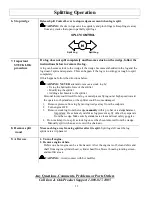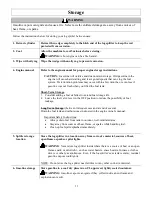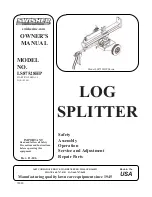
Summary of Important Safety Information for Operation
31
Safety During Towing
Read instructions
. Review towing safety instructions in your towing vehicle manual.
Securely attached
. Be sure the log splitter is securely attached to the towing vehicle before towing.
Tires
. Be sure tires are fully inflated and in good repair before towing the splitter. When adding air to tires, do
not over-inflate -- serious injury could occur if tire explodes.
Added length
. Be aware of the added length of the splitter.
Speed limit
. Never tow this log splitter over
45
mph. Faster speeds may result in loss of control.
Rough terrain
. Be extra cautious and drive slowly when traveling over rough terrain.
Under the influence
. Never tow this splitter while under the influence of alcohol, drugs, or medication.
On public roads
. If towing on a public road, make sure to comply with all local, state, and federal towing
requirements. It is the sole responsibility of the purchaser to obtain licensing, trailer lights, safety chains or
signage, as needed to comply.
Unattended
. Turn off the towing vehicle before leaving the splitter unattended.
Disconnect before operate
. Do not use the log splitter while it is connected to the towing vehicle.
Safety – Before Use
Read/instruct
Read manual.
Do not allow anyone to operate the log splitter who has not read the Owner’s Manual or has not
been instructed on the safe use of the splitter.
Review safety rules
. Before starting this log splitter, review the instructions for safe operation. Failure to follow
these instructions may result in serious injury to the operator or bystanders.
Know how to stop
. Be thoroughly familiar with all controls and with the proper use of the equipment. Know
how to stop the log splitter and relieve system pressure quickly if needed.
Personal protective equipment
Eye protection
. Always wear ANSI Z87.1 approved safety glasses or goggles when operating the machine.
Pieces of log may fly out and serious eye injury can occur.
Boots
. Falling logs can crush feet. Always wear safety shoes or heavy boots when operating or helping to load
logs.
Loose / dangling
. Loose or dangling apparel can become entangled in moving parts. Never wear jewelry or
loose-fitting clothing.
Gloves
. Wear snug fitting gloves without drawstrings or loose cuffs.
Hearing protection
. The use of earplugs or other hearing protection device is recommended.
Safety During Inspection/Maintenance
Always inspect your log splitter before each use, and repair as needed, to keep it in safe working condition:
Engine off.
Always make sure the engine is off before cleaning, repairing or adjusting the splitter, except as
recommended by the manufacturer.
Engine debris.
Debris on a hot engine can be a fire hazard. With the engine off, clean debris and chaff from
engine cylinder head, cylinder head fins, blower housing rotating screen, and muffler areas. Avoid contact with hot
muffler.
Other debris.
Debris on moving parts can cause excess wear. With the splitter engine off, clear debris from
moving parts.
Fuel tank / lines.
Before each use, check fuel tank and fuel lines for leaks. Any fuel leak is a fire hazard. Fix any
fuel leaks before starting engine.
Mechanical parts.
Check to be sure all nuts and bolts are tight to make sure the log splitter is in safe working
condition.
Hydraulic system
. Check the hydraulic system (hoses, tubing, clamps/fittings, pump, and cylinder) carefully
before each use. Do not operate the log splitter with frayed, kinked, cracked or damaged hydraulic hoses, fittings,
or tubing, or if oily residue is observed on any of the components. High fluid pressures and temperatures are
developed in the log splitter. Hydraulic fluid escaping through a pin hole sized opening can burn or puncture skin,
resulting in wounds that could cause blood poisoning, infection, disability, gangrene, amputation, or death.
Therefore, the following instructions should be heeded at all times when inspecting or servicing the hydraulic
Summary of Contents for BH2W2016GX
Page 2: ...Hazard Signal Word Definitions 2...
Page 6: ...Safety Label Location 6 1 2 3 4 5 6...
Page 28: ...Parts Breakdown Exploded View Rev A 28 Fig 05 6 7 8 7 6 6 6 8 6 1 6 8 6 1 6 7...
Page 36: ...Assembly Instructions 36 Manual Bag Contents...
Page 40: ...40 This page has intentionally been left blank...






























